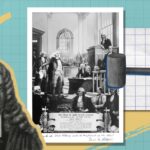The U.S. Supreme Court heard arguments yesterday in a pair of cases challenging laws in Texas and Florida that sharply limit the free speech rights of social media companies by prohibiting them from choosing what they can and cannot post on their websites. These laws forbid companies like Facebook, Twitter, and YouTube from “deplatforming,” “shadow-banning,” or “censoring” the comments posted by users—despite the fact that these companies are private businesses that have the right to choose what activities they’ll allow on their sites.
The Goldwater Institute filed a brief in support of the social media companies, focusing in particular on a Supreme Court precedent from 1980 called PruneYard v. Robins—a case on which lawyers from Texas and Florida heavily relied in their arguments yesterday. In the PruneYard case, the California Supreme Court held that the state’s own constitution blocked the owners of shopping malls from deciding whom to allow onto their property to hand out petitions or leaflets. When the shopping mall owners appealed, the U.S. Supreme Court upheld that rule, declaring that shopping centers were the equivalent of the “town square” in the modern world, and therefore that their owners had no say in who engaged in “free speech” on their property.
That ruling was clearly wrong. Property owners, including the owners of Facebook, Twitter, and other websites, have the right to choose how their property is used by others, just like a homeowner has the right to decide whether to allow someone to give a political speech in his or her living room. And just as a homeowner can’t be accused of “censorship” for throwing someone out of his house for giving a political speech, it’s wrong to accuse the owners of social media companies of “censorship” when they refuse to convey someone else’s speech.
“Censorship”—as any first-year law student learns—is something only the government can do; private parties can’t censor, because censorship means the use of coercion to curtail speech, and only the government is allowed to use coercion. If a private company blocks a person from speaking on the company’s property, that’s not coercion—it’s an ordinary use of private property rights.
Despite that basic, centuries-old rule, several justices were tripped up by it during yesterday’s arguments. Justice Brett Kavanaugh correctly recited the rule, saying at one point, “when the government excludes speech from the public square, that is obviously a violation of the First Amendment. When a private individual or private entity makes decisions about what to include and what to exclude, that’s protected generally editorial discretion, even though you could view the private entity’s decision to exclude something as ‘private censorship.’” But Justice Samuel Alito seemed not to understand, asking sarcastically, “If somebody in 1917 was prosecuted and thrown in jail for opposing U.S. participation in World War I, was that ‘content moderation’?” Of course, the answer is no—that was censorship, because only the government—not Twitter or Facebook—can throw someone in jail. If someone gets thrown off of Twitter, he or she remains as free as ever, and can even start his or her own social media company (as, for example, former President Donald Trump did).
The reason this public/private distinction is so important is because it alone protects the rights of property owners and business owners to decide what messages they convey or don’t convey. The business owners in the PruneYard case were denied that right when the Supreme Court disregarded the crucial difference between public and private entities and used the First Amendment, not as a shield to protect speech from the government, but as a sword to attack property owners and undermine their rights, all under the guise of protecting free speech.
That’s precisely what Florida and Texas lawmakers did in this case, misappropriating the term “freedom of speech” for laws that actually violate free speech—specifically, the right of these businesses to choose what content they broadcast. Although the states try to conceal this sleight-of-hand by claiming that the companies are “common carriers,” they’re nothing of the sort. According to the legal tradition, a “common carrier” is supposed to be a sort of monopolistic entity that enjoys certain special government favors, and therefore is required to surrender certain rights in exchange, particularly the right to choose what customers to serve. The typical example is a railroad, which enjoys certain government privileges, such as the power of eminent domain to lay its tracks, or protections against competition from other railroads. But nothing like that is true of Facebook or Twitter. They’re ordinary media companies like newspapers or magazines, and are thus entitled to the same First Amendment protections—as well as property rights protections. Yet bad precedents such as PruneYard ignore these rules and have therefore encouraged politicians to do what Texas and Florida have attempted here: to effectively confiscate these businesses and use them in the way the government sees fit.
In our brief, we urged the Supreme Court to overrule PruneYard, which even California courts have shied away from in the years since—and to strike down the Texas and Florida laws. If conservatives are upset that Twitter won’t publicize their messages enough, then they have plenty of other options—Truth Social, for example—or they can start new companies or use other forms of media—radio, television, podcasts, Truth Social, etc.—to get their word out. While it might seem convenient today for Republican lawmakers in some states to try to seize control of these media companies, that only paves the way for Democratic legislators in other sates to do the same the next time around. The better solution is that one the Constitution contemplates and that Americans have practiced for generations: hands off of free speech, and hands off of other people’s private property.
Timothy Sandefur is the Vice President of Legal Affairs at the Goldwater Institute.









